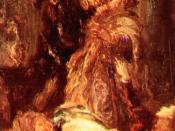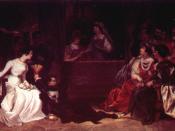Hamlet's Fatal Flaw Hamlet's Fatal Flaw was that he had a hard time carrying out his plans.
Many times did Hamlet plan on doing things, yet he did not carry out these plans. Hamlet was not a bad guy, but more of a tragic hero.
In the opening scenes of the play, the Ghost of Hamlet's father reveals the truth about his death to his son. He tells Hamlet to avenge his tragic murder. Hamlet's response seems like he has quick plans to carry out his fathers wishing, by saying "Haste me to know't that I with winds as swift"æ May sweep to my revenge." (p. 29 lines 27-29) Unfortunately, Hamlet's inability to act on his father's extortion has him reluctant to kill the King Claudius by the end of that very scene, when he says, "This time is out of joint, O cursed spite, that I was ever born to set it right."
(p. 35 lines 197-198) Here, Hamlet is already having doubts and wishing that he wasn't the one that had to carry out the revenge for his father. Obviously Hamlet has real problems when it comes down to dealing with things.
As the play goes on, Hamlet still has not done a thing to avenge his father. In act II, scene 2, Hamlet decides that before he can avenge his father's death, he must make sure that the Ghost was telling the truth. This simply gives Hamlet more excuse to procrastinate. Hamlet makes a plan to have a play in which he will test the kings reaction to. The play would be about a king who is murdered by someone putting poison into his ear. Then the murderer becomes king and is loved by the fallen kings wife. Just as it was for Claudius who killed the king and took his wife. When the play is seem by Claudius, Claudius becomes outraged and ends the play. Hamlet knows now that Cladius is guilty.
Even here, hamlet is speaking to his friend Guilderstern and says "I lack advancement" (p. 81 line 338) when his friend asks what is wrong with him. I think that Hamlet knows his flaw but he won't act on it.
In act III, scene 3, Hamlet is ready to kill the king, but stops himself because the king is praying. Hamlet thinks that because the king is praying that if he killed him now the king would go to heaven. He decides yet again to delay avenging his father's murder, this time until he can kill the King while he is in a vile condition, such as "When he is drunk asleep; or in his rage; Or in the incestuous pleasure of his bed." (p. 87 lines 89-90) Later Hamlet even proclaims "How all occasions do inform against me, and spur my dull revenge." (p. 104 lines 33-34) In the end of the play, we see that Hamlet's inability to act causes his tragic demise. Hamlets failure to revenge his father when he should have, costs him not only his life, but also his mother's. In the final scene, Hamlet duels with Laertes, who has conspired with the King to kill Hamlet. In the King's attempt to kill Hamlet, he accidentally poisons the Queen. Laertes delivers the fatal wound to Hamlet with a sword dipped in a deadly poison and it is only with his final life breath that Hamlet finally kills the King.
So, Hamlet has finally killed the king, but not by going out and killing the king like he said, but with a poison the king made himself to kill Hamlet. But it would be okay to say that Hamlet avenged his father, and his fathers later wish for the queen to be left to die without Hamlet killing her. Both Hamlet's and his father's names are cleared too.
Basically, everything is made clear to the people and besides Hamlet's sad death, everyone who deserved to die or be killed, was killed. Hamlet obviously wouldn't have made a good king anyways, without the ability to act on your own wishes, you would never rule a kingdom very well.





